Middle East
Why are relations between Algeria and France so bad? | Politics News
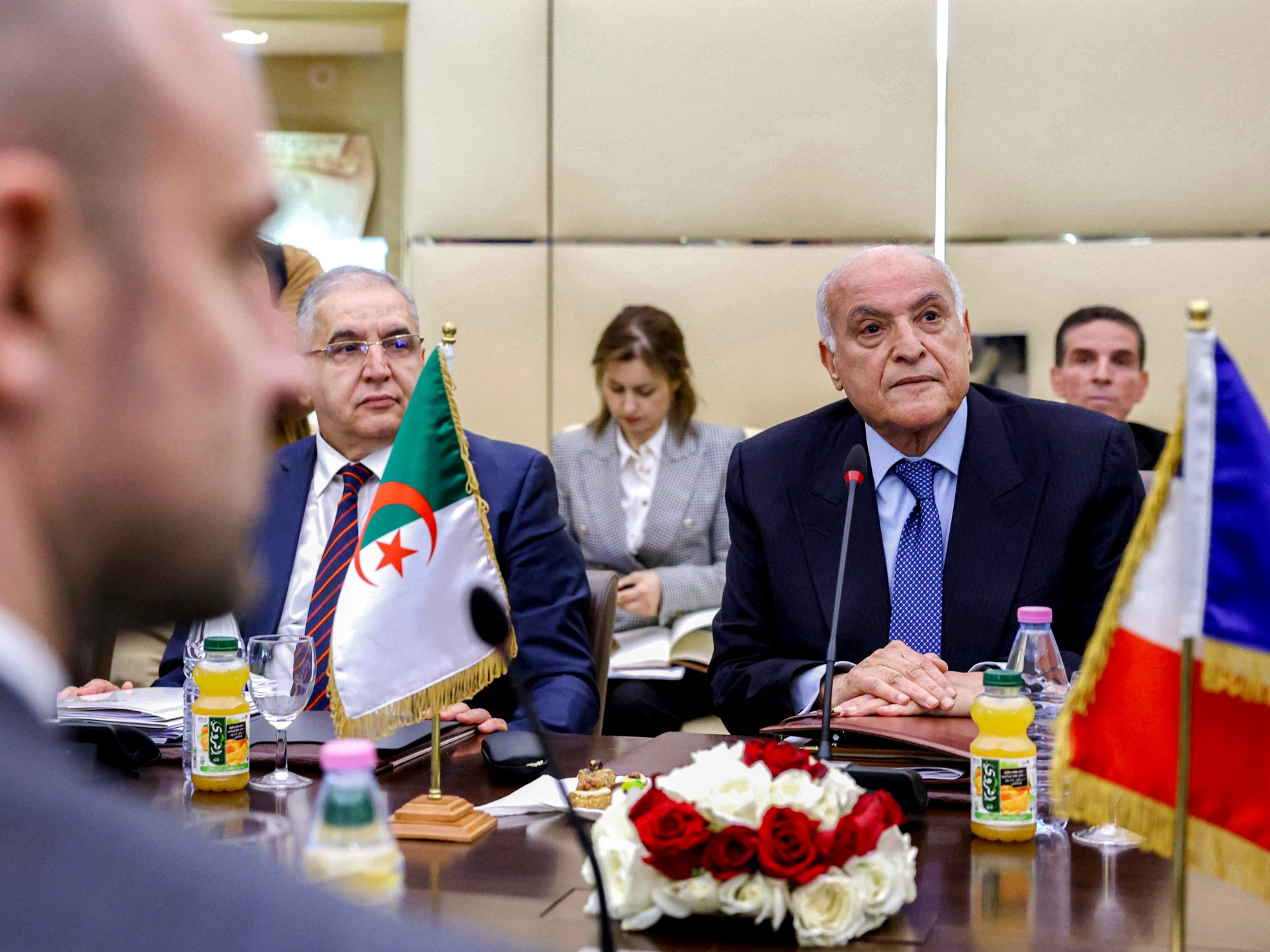
Relations between Algeria and its former coloniser, France, have rarely been straightforward.
After hitting a low point in July when France supported Algeria’s regional rival Morocco over its claim to the disputed territory of the Western Sahara, relations appeared to be recovering.
But then the April arrest in France of an Algerian consular official along with two other men for alleged involvement in the kidnapping near Paris of Algerian government critic Amir Boukhors has triggered a new wave of tensions.
So why are diplomats now being expelled, and what does this mean for relations between Algeria and its former coloniser?
Let’s break it down:
Who is Amir Boukhors?
Boukhors, or Amir DZ, is an Algerian online influencer and critic of Algerian President Abdelmadjid Tebboune with more than 1 million subscribers on TikTok.
The French government gave Boukhors political asylum in 2023.
But as far as the Algerian government is concerned, he’s a fraudster and a “terrorist”, who they’ve been seeking to extradite from France since 2016.
Algeria has tried to extradite Boukhors nine times. All attempts have been declined by France.
Why would an Algerian consular official allegedly want to kidnap him?
Speaking to the newspaper Le Parisien in an interview published on April 9, Boukhors said that on returning to his home in Val-de-Marne near Paris during the evening of April 29, 2024, he was stopped by an unmarked car with flashing lights.
Four men in civilian clothes handcuffed him and threw him into the vehicle.
“They first told me that an Algerian official wanted to talk to me, that that was why they were taking me. Then they told me the plan had changed and that I was going to Amsterdam,” Boukhors told the newspaper.
Boukhors said he was then forced to swallow sleeping pills and was held in a “container” for more than 27 hours before being released without explanation.
A subsequent investigation by France’s counterespionage agency uncovered information leading to the arrest on April 11 of three men with a fourth still reportedly at large.

No information has been released about two of the men. However, the third was an Algerian consular employee, French officials said.
Algeria issued a statement the following day strongly denying its official’s involvement and protesting the person’s arrest “in public … without notification through the diplomatic channels”.
The statement denounced what it charged was a “far-fetched argument” based “on the sole fact that the accused consular officer’s mobile phone was allegedly located around the home” of Boukhors.
All three suspects were later charged with “kidnapping or arbitrary detention … in connection with a terrorist undertaking”.
What was the diplomatic response?
On April 14, Algeria announced that 12 French consular officials had 48 hours to leave the country.
The statement, read on public television, confirmed the expulsions had been ordered in response to France’s arrest of the Algerian official.
According to the statement, the arrest had been intended to “humiliate Algeria, with no consideration for the consular status of this agent, disregarding all diplomatic customs and practices”.
France responded in kind the following day, expelling 12 Algerian consular officials from its territory and recalling its ambassador from Algiers.
A statement from the office of French President Emmanuel Macron described the Algerian decision as “incomprehensible and unjustified” and said Algiers should “resume dialogue” and “take responsibility for the degradation in bilateral relations”.
Why have relations between France and Algeria historically been poor?
France colonised Algeria for 132 years, killing Algerian civilians and creating a class structure in which European settlers and their descendants were on top.
The French refused to leave Algeria, considering it an integral part of France. It was only after a war of independence that France finally left in 1962. Algeria is still referred to as the “country of a million martyrs” because of the number of people killed by France during the fight for independence.
But the dispute has not ended there. The issue of the Western Sahara is also causing tension, not just between France and Algeria but also across North Africa.
Western Sahara – a disputed territory in northwestern Africa – is at the centre of the poor relations between Algeria and Morocco. Rabat claims the territory as its own and occupies the majority of it while Algeria supports the pro-independence Polisario Front and has taken in tens of thousands of Sahrawi refugees.
What has France’s position on the Western Sahara been?
France has largely backed Morocco – despite the United Nations not recognising Rabat’s sovereignty over the Western Sahara. And last year, Macron said France’s position was that it supported Moroccan sovereignty over Western Sahara.
At the time, Algeria voiced its “deep disapproval” of France’s “unexpected, ill-timed and counterproductive” decision to endorse Morocco’s autonomy plan for Western Sahara and recalled its ambassador.
However, relations between the two were thought to be improving since then.
Speaking in early April after a series of talks intended to restore relations after the rift, French Foreign Minister Jean-Noel Barrot said: “We are reactivating as of today all the mechanisms of cooperation in all sectors. We are going back to normal and to repeat the words of President Tebboune: ‘The curtain is lifted.’”
But the Boukhors case and the diplomatic expulsions that have followed it have made it clear that the curtain has fallen right back down.
Middle East
Drones hit ‘Freedom Flotilla’ Gaza aid ship in international waters | Israel-Palestine conflict News

Freedom Flotilla Coalition demands Israel answer to violations of international law, including blockade and ‘bombing of our civilian vessel’.
A ship carrying aid to Gaza in a bid to break Israel’s blockade has been hit by drones in international waters off Malta, according to the Freedom Flotilla Coalition (FFC), the group that organised the mission.
The FFC said in a statement on Friday that the vessel, now located 14 nautical miles (25km) from Malta, was the target of two drone strikes while on its way to Gaza. The ship had been seeking to deliver aid to the besieged enclave, where aid groups warn people are struggling to survive following a two-month total blockade by Israel.
“Armed drones attacked the front of an unarmed civilian vessel twice, causing a fire and a substantial breach in the hull,” the group said.
The statement did not directly accuse Israel of carrying out the attack.
However, it did demand that “Israeli ambassadors must be summoned and answer to violations of international law, including the ongoing blockade and the bombing of our civilian vessel in international waters”.
Israel has not commented on the drone strikes.
BREAKING: At 00:23 Maltese time, a #FreedomFlotilla ship was subjected to a drone attack. The front of the vessel was targeted twice, resulting in a fire and a breach in the hull. The ship is currently located in international waters near #Malta. An #SOS distress signal was sent. pic.twitter.com/J6oEQafuOb
— Freedom Flotilla Coalition (@GazaFFlotilla) May 2, 2025
Nicole Jenes of the FFC told Al Jazeera that the attack on the Conscience at 12.23pm local time (10:23 GMT) on Friday morning blew a hole in the vessel and set the engine ablaze.
The strike left 30 Turkish and Azeri activists on board engaged in a frantic effort to bail out water and keep the vessel afloat, she added.
The group statement said “a vessel from Southern Cyprus” had been dispatched after it sent SOS calls.
Later on Friday, the Maltese government said in a statement that the fire on the ship had been brought under control and that the vessel was being monitored by authorities. It was unclear whether the authorities had directly intervened to put out the fire and what has happened to the activists.
Jenes, currently in Malta, said that the group was not aware of the situation on board the ship as communication with the crew had been lost.
“They were hiding in the night in the rooms of the ship because they were afraid of the drones … We lost contact with them,” she said.
‘On the verge of total collapse’
The FFC, formed by peace activists from several countries last year, uses a converted trawler to try to defy Israel’s blockade on Gaza.
Israel halted humanitarian aid two months ago, shortly before it broke a ceasefire and restarted its war against Hamas, which has devastated the Palestinian enclave and killed more than 50,000 people.
“It’s very important to … understand this attack is an extension of the genocide that is happening in Gaza and cannot pass unpunished,” Jenes said, insisting that the FFC is asking the world to turn its eyes to the blockade.
The International Committee of the Red Cross (ICRC) said in a report released on Friday that the humanitarian response in Gaza is “on the verge of total collapse”.
“Six weeks of intense hostilities, combined with a complete blockage of aid for two months, have left civilians without the essentials they need to survive. Without an immediate resumption of aid deliveries, the will not have access to the food, medicines, and life-saving supplies needed to sustain many of its programmes in Gaza,” the ICRC said.
Middle East
Palestine the world’s most dangerous place for journalists, RSF says | Israel-Palestine conflict News

US President Donald Trump overseeing ‘troubling deterioration’ in press freedom in US, Reporters Without Borders says.
Palestine has become the world’s most dangerous state for journalists amid Israel’s war on Gaza, with dozens of reporters likely killed specifically due to their work, a media freedom watchdog has said.
Israeli forces killed nearly 200 journalists in the first 18 months of the war, at least 42 of whom were slain while doing their job, Reporters Without Borders said on Friday as it released its World Press Freedom Index 2025.
“Trapped in the enclave, journalists in Gaza have no shelter and lack everything, including food and water,” said the Paris-based group, which is also known by its French acronym RSF.
“In the West Bank, journalists are routinely harassed and attacked by both settlers and Israeli forces, but repression reached new heights with a wave of arrests after 7 October, when impunity for crimes committed against journalists became a new rule.”
Journalists suspected of collaborating with Israel are also hampered in their work by Hamas and the Islamic Jihad, while a cybercrime law adopted by the Palestinian Authority limits freedom of expression and freedom of the press, RSF said in its report.
Palestine ranked 163rd for press freedom in the latest index, a drop of six places from 2024.
Of 180 jurisdictions, 112 saw declines in press freedom, with the average score globally falling to a record low of 55 points, according to the report.
The United States dropped two places to a record low of 57, with the watchdog accusing US President Donald Trump of overseeing a “troubling deterioration in press freedom”.
“President Donald Trump was elected to a second term after a campaign in which he denigrated the press on a daily basis and made explicit threats to weaponize the federal government against the media,” RSF said.
“His early moves in his second mandate to politicise the Federal Communications Commission (FCC), ban The Associated Press from the White House, or dismantle the US Agency for Global Media, for example, have jeopardised the country’s news outlets and indicate that he intends to follow through on his threats, setting up a potential crisis for American journalism.”
Israel dropped 11 places to 112th, with Reporters Without Borders pointing to growing restrictions on press freedom, media plurality and editorial independence since the start of the war in Gaza.
“Since 2021, only journalists working for Channel 14, a media outlet that covers Prime Minister Benjamin Netanyahu in a favourable light, have been granted interviews with the country’s leader, who accuses the Israeli press of conspiring against him,” the group said.
“In 2024, the Minister of Communication called on the government to boycott Haaretz, one of the few newspapers to criticise Netanyahu’s policies, including the massacre of civilians in Gaza – a topic that is largely suppressed.”
Eritrea was the lowest-ranked jurisdiction, just behind North Korea and China.
Norway was ranked first for press freedom, followed by Estonia, the Netherlands and Sweden.
Middle East
Israel strikes near Syria’s presidential palace, issues warning over Druze | Syria’s War News
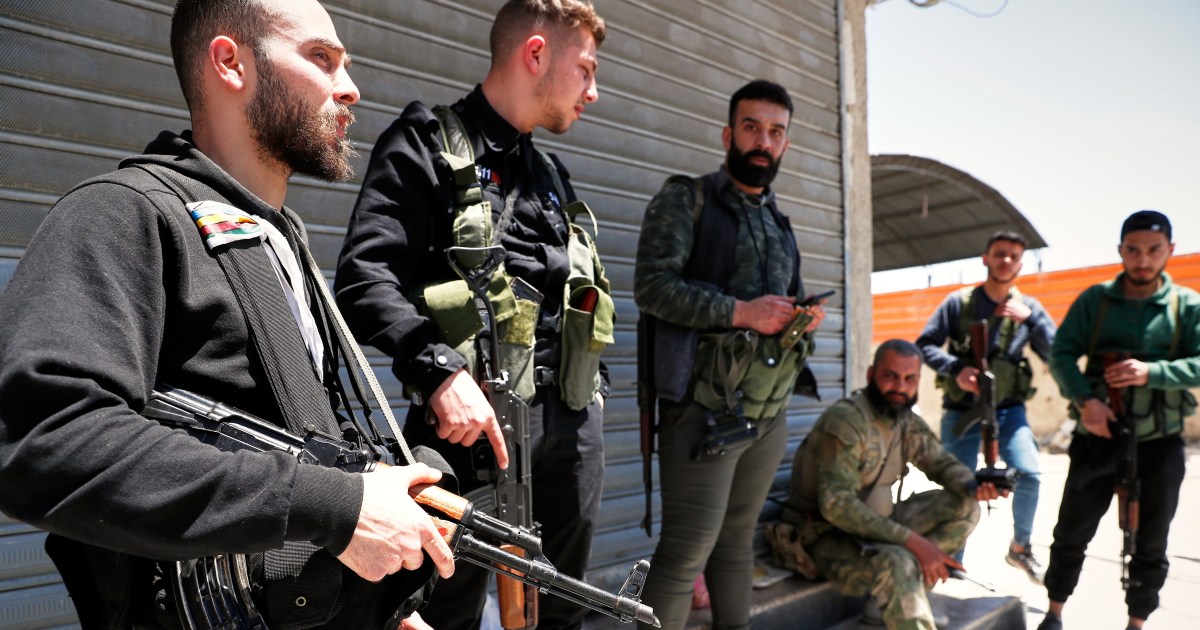
Israel has ramped up attacks on Syria following a week of sectarian violence against the Druze community.
Israel’s military has launched air strikes near Syria’s presidential palace in Damascus after accusing the Syrian authorities of failing to protect the country’s Druze minority from sectarian violence.
The attack early on Friday was the second of its kind by Israel this week and is seen as sending a strong message to Syria’s transitional government led by President Ahmed al-Sharaa.
“This is a clear message to the Syrian regime: We will not allow [Syrian] forces to deploy south of Damascus or any threat to the Druze community,” Israeli Prime Minister Netanyahu said in a joint statement with Israel’s Defence Minister Israel Katz shortly after the attack.
More than 100 people were killed this week during fighting between pro-government forces and Druze fighters in Syria.
The violence has been condemned as a “genocidal campaign” by Syria’s Druze spiritual leader Sheikh Hikmat al-Hijri, who called for an immediate intervention by “international forces to maintain peace and prevent the continuation of these crimes”.
On Thursday, Israel’s Foreign Minister Gideon Saar urged the international community to “fulfil its role in protecting the minorities in Syria – especially the Druze – from the regime and its gangs of terror”.
Israel has previously called Syria’s transitional government a “terror group from Idlib that took Damascus by force” and has ramped up its support for the Druze minority this week.
The Druze minority are a 10th-century offshoot of a branch of Shia Islam, and live primarily in Syria, Lebanon and Israel, and have been allies of Israel with many Druze serving in the Israeli military.
Syrian Foreign Minister Asaad al-Shaibani on Thursday called for “national unity” as “the solid foundation for any process of stability or revival”.
“Any call for external intervention, under any pretext or slogan, only leads to further deterioration and division,” he wrote on X.
The sectarian violence poses one of the most serious challenges yet to the government of al-Sharaa, who led a coalition of rebel groups to overthrow Syria’s President Bashar al-Assad in December.
Syria has been faced with sectarian violence since then.
The fighting this week follows a massacre in March of more than 1,700 civilians from the Alawite community by security forces and allied groups, according to the UK-based Syrian Observatory for Human Rights.
The Alawites, who are traditionally based near the Mediterranean coast in western Syria, are the same ethnic group as the toppled al-Assad.
-
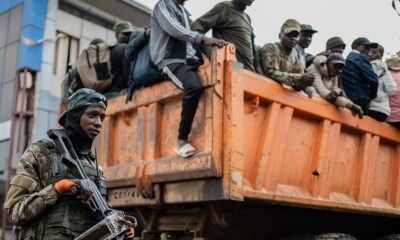
 Africa2 days ago
Africa2 days agoRed Cross escorts hundreds of stranded Congolese soldiers from rebel-controlled city to capital
-
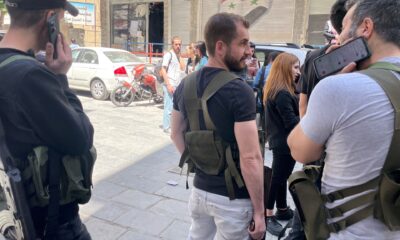
 Middle East2 days ago
Middle East2 days agoSyria says it rejects ‘foreign intervention’ after Israeli strikes | News
-
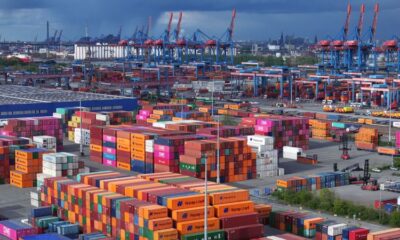
 Europe2 days ago
Europe2 days agoEurope saw faster economic growth early this year but Trump’s tariffs have dimmed its prospects
-

 Conflict Zones2 days ago
Conflict Zones2 days agoKashmir attack: How India might strike Pakistan – what history tells us | Border Disputes News
-

 Europe2 days ago
Europe2 days agoYouras Ziankovich: American detained in Belarus is freed, US official says
-

 Lifestyle2 days ago
Lifestyle2 days agoWhat is dandyism, the Black fashion style powering the 2025 Met Gala?
-

 Asia2 days ago
Asia2 days agoChina suggests Covid-19 originated in US in response to Trump allegation
-

 Europe1 day ago
Europe1 day agoSouth Korea’s unique housing culture has inspired a major new exhibition



